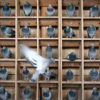I have several calendars; some paper, some digital. Since using the calendar on my phone, I’ve wrestled to determine which tool serves me best. To be sure, the phone app is better for many reasons. For example, when I make changes, I don’t have to cross things out and leave messes in tiny squares on paper.
But a paper calendar that needs replacing every January makes manifest the reality that a new chapter of time has begun. The digital version has no such fanfare. Scrolling from December 31st of one year to January 1st of the next appears no different than scrolling from October 12th to 13th.
You may find these ramblings pedantic but I need reminders to “number my days” as Moses told us to do in Psalm 90. Replacing my paper calendar in January, turning to a new page each month, and looking at a week “at a glance” prompts me to think beyond the calendar, beyond time to the eternal.
I note that Moses prayed, “Teach us to number our days aright” (Psalm 90:12). I guess that means it won’t just come naturally. We need to be taught. Perhaps this is because we have some default setting that sees time as merely “passing” or “fleeting.” Even our culture’s exhortation to “seize the day” fails to see “the day” as part of something significantly larger.
Michael Wilcock, in his commentary on Psalm 90 notes, “The numbering of days is a lesson not in elementary arithmetic but in life-changing theology. Teach us not how many days we have lived so far, still less how many may be left to us, but why it is that our years are so comparatively few (why seventy, and not a thousand – why, indeed the patriarchs were limited even to a thousand), and why they are so beset with trouble.”
Time management skills help (to some extent). Apps ease efficiency (some of the time). Calendars facilitate planning (if used well). Goal setting propels action (or generates guilt and anxiety).
But what we need most is an eternal perspective that sets time in its proper place. We steward time, knowing we are made for eternity. We set goals but acknowledge, “if the Lord wills.” We groan during our “threescore and ten,” longing for time when there will be no time. We see every day as a gift but look forward to the “day” when we no longer need calendars.



